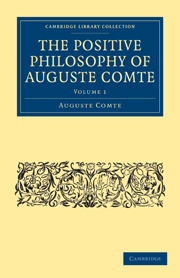CHAPTER I - GENERAL VIEW
Published online by Cambridge University Press: 29 August 2010
Summary
Imperfect condition of the science
Astronomy was a positive science, in its geometrical aspect, from the earliest days of the School of Alexandria; but Physics, which we are now to consider, had no positive character at all till Galileo made his great discoveries on the fall of heavy bodies. We shall find the state of Physics far less satisfactory than that of Astronomy, not only on account of the greater complexity of its phenomena, but under its speculative aspect, from its theories being less pure and systematized, and, under its practical aspect, from its previsions being less extended and exact. The precepts of Bacon and the conceptions of Descartes have advanced it considerably in the last two centuries, in its character of a positive science; but the empire of the primitive metaphysical habits is not to be at once overthrown; and Physics could not be immediately imbued with the positive spirit, which Astronomy itself, our only completely positive science, did not assume in its mechanical aspect till the middle of that period. The further we go among the sciences, the more we shall find of the old unscientific spirit, and not only in their details, but impairing their fundamental conceptions. If we now compare the philosophy of Physics with the perfect model oflFered to us by astronomical philosophy, I hope we shall perceive the possibility of giving to it, and afterwards to the other sciences in their turn, the same positivity as the first, though their phenomena are far from admitting of an equal perfection of simplicity and generality.
- Type
- Chapter
- Information
- The Positive Philosophy of Auguste Comte , pp. 215 - 231Publisher: Cambridge University PressPrint publication year: 2009First published in: 1853

